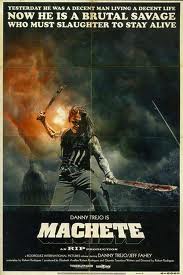Machete
 When a movie taps roiling public sentiment even as it seeks to shape that opinion, it will doubtless be noticed. A film that, judging from the nearly empty theater in which I saw it during its opening weekend, might have disappeared quickly has instead gotten a great deal of public attention. Robert Rodriguez, the talented director who “chopped, shot, and scored” such excellent action films as El Mariachi” and Desperado, has with Machete attempted to give his fans a gift. The film has its roots in a “fake” trailer shown during the “Grindhouse” double feature in which Rodriguez’ Planet Terror was shown with Quentin Tarantino’s Death Proof. The intent was to create an experience evocative of 1970s B-movie fare, and Rodriguez’ contribution to that effort was as much homage as it was parody of the cheaply made horror movie genre.
When a movie taps roiling public sentiment even as it seeks to shape that opinion, it will doubtless be noticed. A film that, judging from the nearly empty theater in which I saw it during its opening weekend, might have disappeared quickly has instead gotten a great deal of public attention. Robert Rodriguez, the talented director who “chopped, shot, and scored” such excellent action films as El Mariachi” and Desperado, has with Machete attempted to give his fans a gift. The film has its roots in a “fake” trailer shown during the “Grindhouse” double feature in which Rodriguez’ Planet Terror was shown with Quentin Tarantino’s Death Proof. The intent was to create an experience evocative of 1970s B-movie fare, and Rodriguez’ contribution to that effort was as much homage as it was parody of the cheaply made horror movie genre.
This is relevant because Rodriguez’ Machete is a similar attempt. Just as the seventies gave us “blacksploitation” movies like Shaft and Cleopatra Jones, Rodriguez’ Machete is a “Mexploitation” movie that trades in fascination with stereotypical Mexican culture and the debate over illegal immigration. It is Rodriguez’ treatment of the latter that has gotten him so much bad press. Various commentators have denounced Machete as racist. It does indeed depict characters knowingly engaging in a race war with their hated oppressors — the hated oppressors, in this case, being corrupt politicians and vigilante paramilitary gunmen who just happen to be fighting the incursion of illegal aliens crossing the Mexican border into the United States. Revolutionary rhetoric and imagery abound, with all roads to revolution leading to the same left-wing outcome of an open border.
What every critic of this movie is missing, however, is that it is too ridiculous to be taken seriously. It’s very hard to become exercised over the movie’s “race war” theme when everything about Machete is so absurd. It’s not that I take lightly the threat offered by La Raza and its ilk; I have spoken out before regarding popular entertainment that foments racial hatred against “Anglo” whites (the presumed objects of Rodriguez’ ire). Rather, Machete is so obviously a badly executed attempt to create a 1970s B-movie that I can’t see anyone taking at face value any sentiment expressed in it. In this it is similar to the Clive Owen actioner “Shoot ‘Em Up,” a movie so preposterous, so gratuitously violent, that it is impossible for a conservative or libertarian to be offended by its incongruous gun-control message.
The only thing more abundant in Machete than naked women (Michelle Rodriguez appears, for example, in a costume that is little more than hip-huggers, a bra, and shoulder holsters, an exposure of her impressive form that is wasted on an audience whose members can only yawn as the movie’s tediously dull climax flails about around her) is bad acting. The actors aren’t merely overdoing it for the sake of satire; they’re genuinely terrible. Danny Trejo, who excels as a henchman and heavy, does not have the acting chops to carry a lead role, nor is his screen presence up to the task. Steven Seagal, playing a villain, flounces around in a Nehru circus tent looking like nothing so much as a patio umbrella with the cover still on; his clothing, tailored to hide his gut, is so overlarge that he’s one oversized vinyl basset hound head away from being a football team mascot. Robert De Niro, slumming and attempting another awkward comedic role, lapses into his trademark New York gangster accent, ditching the cornpone, cowboy-hat-wearing conservative he plays with all the glee of any liberal showing who he thinks Republicans are supposed to be.
Jessica Alba, for her part, is wooden, and when she’s forced to kiss Danny Trejo (not once, but repeatedly), the audience recoils in horror as the delicate waves of her lips crash against the rocky shoreline that is Danny Trejo’s pocked horror of a face. The two don’t share a romantic moment so much as they press their faces together reluctantly. Lindsey Lohan, using a body double for the most revealing of her nude scenes, plays the drug-addled daughter (a bit too close to the mark, that) of Jeff Fahey’s villain (whom Fahey plays with all the subtlety of Snidely Whiplash). Arguably the best straight performance is turned in by Michelle Rodriguez — and that’s a sentence you’ll see used in very few movie reviews.
The movie is not without its bright spots, and even funny moments, such as Cheech Marin playing a gun-toting priest, the ever-fun Tom Savini (woefully underused) as an assassin, and a hammy Don Johnson proving he can out-act all the rest of them as the scene-chewing leader of the border vigilantes. These touches do not compensate for the film’s plodding pacing, its plot holes (deliberate or otherwise), or the fact that, ultimately, it just isn’t a lot of fun to watch.
Machete is a ludicrous, tasteless movie, yes. It is self-parody writ so large that it circles back around to arrive simply at poor filmmaking. To see in this movie a call to murder Anglos is not unreasonable, given that this is explicitly depicted. To take that call seriously, however, is to grant Machete a credibility it does not deserve, either as entertainment or as polemic. It fails miserably at both, leaving the viewer with no urge more political or ideological than simply to demand a refund of the price of admission.

